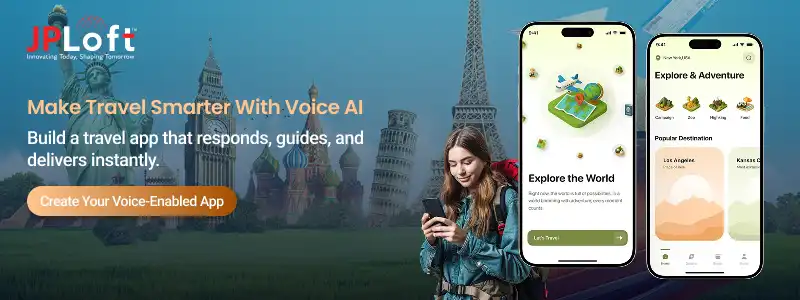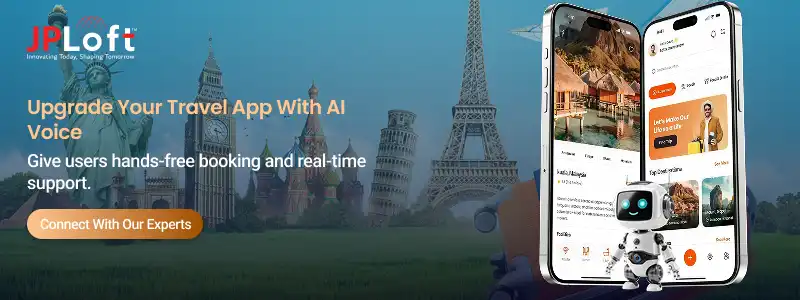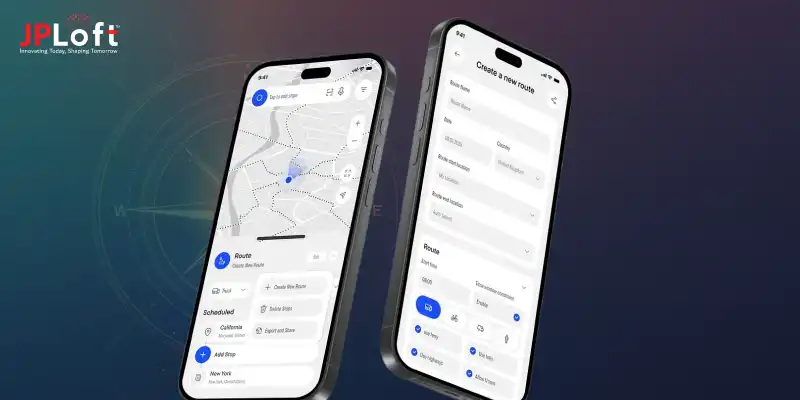Key Takeaways:
AI voice assistants are transforming how users search, plan, and book trips by enabling faster, intuitive, and hands-free interactions across all travel touchpoints.
The Role of AI Voice Assistants in Travel Apps is expanding as travelers demand instant support, personalized recommendations, and frictionless booking experiences.
Features like multilingual voice recognition, real-time updates, and conversational AI help improve user satisfaction while reducing navigation complexity in mobile travel platforms.
Integrating AI-powered voice capabilities strengthens competitive advantage by enhancing accessibility, boosting engagement, and streamlining end-to-end travel workflows.
JPLoft helps brands build advanced, voice-enabled travel solutions by combining deep industry experience with high-quality engineering and future-ready AI technologies.
AI is changing the way people used to plan, book, and experience travel, and voice technology is at the forefront of that shift. Today’s travelers want faster responses, instant guidance, and hands-free convenience, especially when they’re on the move. This is where AI voice assistants step in.
From checking flight updates to suggesting nearby attractions, they simplify tasks that once required tapping through multiple screens. As travel apps evolve, these smart voice-driven tools are becoming essential for delivering seamless, intuitive, and personalized user experiences.
Understanding the role of AI voice assistants in travel apps helps businesses recognize how these tools enhance user satisfaction, streamline navigation, and support faster travel decisions.
This blog explores how AI-powered voice assistants work, why they matter, the technology behind them, and what it takes to integrate them into modern travel applications.
What Are AI Voice Assistants in Travel?
AI voice assistants in travel apps are intelligent, speech-powered systems that let users interact with a travel app using natural, conversational language.
Instead of tapping through menus, travelers can simply speak to get information, complete tasks, or receive guidance. These systems rely on AI voice technology in travel, NLP, and machine learning to understand voice commands and deliver real-time, accurate responses.
How They Enhance Travel Apps
-
Quickly retrieve information such as flights, hotels, weather, or local attractions
-
Offer personalized suggestions based on travel history
-
Enable smooth, voice-driven travel experiences for users who prefer hands-free options
-
Support global travelers with multilingual voice assistant for travel capabilities
As AI voice assistants in travel apps evolve, they play a central role in making navigation faster and more intuitive. Travelers can check routes, explore city guides, or manage bookings without lifting a finger, which is ideal when juggling luggage or moving through airports.
Brands today increasingly explore how to create a travel app designed with built-in voice capabilities, recognizing the rising demand for smoother, conversational travel interactions. These assistants also enhance accessibility for users who prefer or require voice navigation.
Why They’re Becoming Essential
With the rapid rise of voice search, voice search in travel apps now helps users discover flights, hotels, activities, and transport options in seconds. This shift encourages companies to innovate with voice-enabled travel apps that reduce friction and offer personalized engagement.
To meet modern expectations, developers study emerging top travel app ideas that integrate voice, AI-powered recommendations, real-time updates, and contextual suggestions, making apps feel more like smart assistants than mere digital tools.
Benefits of Integrating AI Voice Assistants in Travel Apps
AI voice assistants in travel apps are transforming how users search, book, and navigate their trips.
By enabling natural, hands-free interactions, these systems help users access instant information without manually typing or scrolling.
This ease of access creates smoother, faster, and more intuitive journeys while enhancing overall app engagement and user satisfaction.
Here are the key benefits you will experience by integrating AI voice assistants in your travel app.
1. Faster and More Convenient Trip Planning
One of the biggest advantages is speed. Travelers can ask questions like “How do AI voice assistants make travel easier?” or “What can a travel app voice assistant do?” and receive instant answers.
Whether it's suggesting destinations, offering real-time flight updates, or guiding users through visa requirements, voice support helps users make decisions faster. This creates voice-driven travel experiences that feel natural and streamlined.
2. Smarter, Personalized Travel Recommendations
AI voice technology in travel analyzes user preferences, past bookings, and behavioral patterns to provide tailored suggestions. Whether a traveler asks for popular cafés nearby or needs help navigating a new city, the assistant responds with context-aware suggestions.
This is especially useful for brands exploring innovations like AI in hospitality, where personalization is becoming a key differentiator in competitive markets.
3. Hands-Free Travel Assistance Throughout the Journey
Voice-enabled travel apps enable real-time updates, hands-free navigation, and instant rebooking support. This becomes crucial during hectic travel situations, airport rush, itinerary changes, or unexpected delays.
With hands-free travel assistance, users simply speak and the app provides directions, alerts, or alternative recommendations without requiring any manual input.
4. Improved Booking Experience for Flights and Hotels
A significant role of AI voice assistants in travel apps is simplifying bookings. Travelers can ask for fare comparisons, room availability, or nearby stay options.
Through natural commands, voice assistants for booking flights and hotels automate the entire experience, reducing user effort and improving conversion rates for travel brands.
5. Higher Engagement & Revenue Opportunities for Brands
When users receive faster results and personalized recommendations, they engage more with the app. This opens the door for better upselling and cross-selling, important for businesses exploring travel app monetization strategies for generating huge revenue.
Voice assistants also help brands retain users by delivering a frictionless experience, ultimately enhancing customer loyalty and lifetime value.
6. Safer & More Secure Interactions
Reliability and safety are crucial in modern travel ecosystems. Voice assistants add an additional security layer by using biometric voice recognition.
As the industry moves toward stronger digital safety standards, technologies like blockchain in travel apps are being explored in parallel to support secure and transparent data handling.
Together, these benefits highlight not just what AI voice assistants can do, but also why their role in modern travel apps is becoming increasingly essential.
Role of AI Voice Assistants in Travel Apps
AI voice assistants in travel apps are reshaping how travelers communicate with digital platforms. Instead of tapping through menus, users can simply speak and get instant answers.
This evolution highlights what is the role of AI voice assistants in travel apps? They act as intelligent helpers that simplify everything from planning to post-trip support.
As more travelers rely on natural language interactions, AI voice assistants in travel apps are becoming a core element of modern travel experiences. Let’s check out the role of AI voice assistants below.
1] Faster, Smarter Travel Discovery
One major role of AI voice assistants in travel apps is making trip discovery frictionless. Travelers can ask for destinations, compare trips, or check local attractions with quick voice commands.
Voice search in travel apps removes the need for multiple taps, helping users find what they need faster while aligning with travel app development trends that prioritize intuitive navigation and ease of use.
2] Hands-Free Navigation & Real-Time Guidance
During transit, travelers often require quick updates or directions without being able to type. Voice-enabled travel apps support this by providing hands-free access to navigation, airport guidance, local transport assistance, and dining recommendations.
This core capability is central to how AI voice assistants improve travel app experiences, allowing users to stay informed and confident through seamless voice-driven travel experiences.
3] Personalized Suggestions Based on Context
AI voice technology in travel analyzes user behavior, preferences, and real-time context to offer relevant suggestions. Whether recommending hidden spots or adjusting itineraries due to weather changes, the assistant feels responsive and human-like.
This helps apps rival the best travel apps, which increasingly rely on personalization as a competitive advantage.
4] Streamlined Booking Through Natural Voice Commands
Another key role of AI voice assistants in travel apps is simplifying flight and hotel reservations. Through voice-based travel booking apps, users can compare prices, modify bookings, and check availability hands-free.
As brands push immersive experiences, pairing voice technology with innovations like AR, enhances decision-making, especially when visualizing rooms or nearby attractions.
5] Better Post-Trip Insights & Re-Engagement
Once the journey ends, users still need receipts, loyalty updates, or future travel suggestions. Voice assistants help retrieve all of this instantly.
With a seamless flow, developers can create a mobile app that drives higher retention and keeps travelers returning for future planning.
6] Real-Time Problem Resolution During Travel
From lost baggage assistance to flight cancellations, travelers often face unexpected disruptions.
Voice assistants act as real-time problem solvers by offering alternative routes, filing quick support requests, or identifying available flights, all through simple speech commands.
7] Multilingual Support for Global Travelers
Language barriers are a major pain point. AI voice assistants can translate phrases, interpret foreign menu items, and help users communicate with locals or service providers.
This creates smoother international travel experiences, especially as AR in travel apps helps travelers understand signs, menus, and local guidance in real time.
8] Automated Travel Document Assistance
Travelers frequently misplace or forget crucial information like booking IDs, visa details, or boarding passes.
Voice assistants can instantly retrieve documents, remind users about expiry dates, and alert them about check-in windows or gate changes.
9] Enhanced Accessibility for Differently-Abled Travelers
For users with mobility, visual, or motor impairments, voice-enabled travel apps offer independence.
They can navigate, book, or seek assistance without touch interaction, making travel more inclusive.
10] Seamless Integration With IoT & Smart Travel Devices
AI voice assistants connect effortlessly with smart luggage, hotel room systems, rental cars, and wearable devices.
Travelers can check luggage weight, adjust hotel room lighting, or track fitness data, all via voice. This deep integration creates a unified, smart travel ecosystem.
Real-World Case Studies to Take Inspiration From
Real-world implementations offer powerful proof of how AI voice assistants in travel apps are enhancing convenience, speed, and personalization across the travel industry.
These case studies demonstrate how AI voice assistants improve travel app experiences in practical, high-impact scenarios that travelers use every day.
1. Expedia: Voice-Led Trip Management with Amazon Alexa
Expedia was one of the early adopters of voice integration, enabling users to manage itineraries, check flight statuses, and get booking updates through Alexa.
This example highlights what a travel app voice assistant truly does , delivering hands-free convenience while simplifying trip planning.
For brands planning to develop an app like Expedia, integrating voice-led features can significantly elevate user experience and set the app apart from competitors.
2. Kayak: Conversational Search Using Natural Language
Kayak integrated voice search into its platform, allowing users to ask questions like “Where can I go for $500?” or “Find a hotel in Paris this weekend.”
This showcases AI voice technology in travel at its best, turning vague user intent into actionable results.
For businesses planning to develop an app like Kayak, this model demonstrates how voice-driven price comparisons, flexible planning, and conversational search can significantly boost user engagement and decision-making speed.
3. Booking.com: AI-Enhanced Voice Assistance for Seamless Bookings
Booking.com introduced voice support to help users search stays, compare prices, and check booking details through conversational queries.
This demonstrates the practical role of voice assistants for booking flights and hotels, especially for travelers who want quick, hands-free choices.
For companies looking to develop a hotel booking app like Booking.com , this example shows how combining conversational AI with intelligent search capabilities can create faster, more intuitive booking experiences.
4. Lufthansa: Voice-Based Flight Information and Travel Alerts
Lufthansa’s voice assistant delivers real-time flight updates, boarding reminders, and gate changes.
This ensures users get timely information without pulling out their phones, proving why voice-based travel booking apps and voice alerts are becoming essential for modern passengers.
As the industry evolves, brands are exploring deeper innovations like multimodal voice + predictive AI, which align with the rising need for advanced app reliability.
Here, integrating travel app security becomes crucial for implementing voice features securely.
5. Google Travel: Context-Aware Voice Suggestions During Trips
Google Travel leverages contextual AI to offer local recommendations, weather updates, and activity reminders.
This delivers highly personalized voice-driven travel experiences that guide users throughout their journey.
By combining voice interaction with real-time data analysis, Google exemplifies how AI voice assistants make travel easier? through actionable, intelligent travel support.
Technical Architecture & APIs Required
Building voice-enabled travel apps requires a robust technical foundation that ensures accuracy, speed, and secure interactions.
Since travelers depend on quick responses from flight details to hotel availability, the backend must be capable of handling real-time data, complex NLP processing, and continuous voice recognition.
A well-structured travel app tech stack helps achieve this by integrating scalable cloud services, AI frameworks, and third-party travel APIs to support seamless voice operations.
A] Core Architecture Components
A typical architecture for AI voice assistants in travel apps includes several layers:
-
Voice Recognition Layer: Uses ASR (Automatic Speech Recognition) to convert speech into text.
-
NLP & Intent Processing Layer: Determines user intent using NLU engines such as Dialogflow, Amazon Lex, or OpenAI models.
-
Travel Data Engine: Connects with booking engines, airline APIs, hotel platforms, and local discovery services.
-
Context Engine: Provides personalized insights based on user preferences, past searches, and real-time data.
-
Response Generation Layer: Delivers natural, conversational responses back to the user.
These components work together to enable voice search in travel apps and deliver accurate, personalized outcomes.
B] Essential APIs to Power Voice Functionality
Integrating the right APIs ensures the app can process voice commands, retrieve travel data, and execute bookings instantly. Commonly used APIs include:
-
Speech-to-Text APIs: Google Cloud Speech, Amazon Transcribe, Azure Speech.
-
Intent & Language Understanding APIs: Dialogflow, OpenAI Assistant APIs, Rasa NLU.
-
Booking & Travel APIs: Amadeus, Sabre, Travelport, Skyscanner, Booking.com APIs.
-
Maps & Navigation APIs: Google Maps, Mapbox, OpenStreetMap.
-
Personalization APIs: Recommendation engines, user profiling APIs, sentiment analysis APIs.
All of these contribute to delivering smooth voice-driven travel experiences with minimal friction.
C] Role of UX & Visual Architecture
Even though voice interactions reduce screen dependency, a strong UI/UX structure is crucial.
Thoughtful mobile app design ensures the app visually supports the voice assistant, providing prompts, confirmations, and fallback options.
This balance of voice + visual UX improves clarity and reduces user errors, especially during bookings or navigation.
D] System Infrastructure & Deployment Layers
Voice-enabled apps typically rely on cloud environments (AWS, GCP, Azure) with microservices architecture and containerization.
A scalable mobile app tech stack helps support rapid intent processing, model updates, and API integrations without performance drops during peak travel seasons.
E] Quality Assurance, Testing & Optimization
Once the architecture and APIs are in place, rigorous testing becomes essential. This includes voice recognition accuracy tests, multi-accent validation, low-network performance tests, and multilingual voice assistant audits.
Following structured travel app testing practices helps ensure the system performs reliably across diverse travel scenarios and user inputs.
With the technical architecture, APIs, and testing workflow in place, the next crucial step is understanding the investment required to bring these AI-powered voice capabilities into a fully functional travel app.
Cost to Integrate AI Voice Assistants in Travel Apps
The cost to integrate AI voice assistants in travel apps ranges from $12,000 to $45,000 for basic to advanced integration. The cost varies based on the complexity of features, the number of supported languages, and the depth of NLP training required.
Apps with simple voice search or basic intent recognition fall on the lower side, while advanced capabilities, such as multilingual understanding, personalization engines, and real-time booking automation, push the cost toward the higher end.
Cloud compute usage, API licensing (Google, AWS, OpenAI), and additional engineering for testing further influence the overall budget. For travel brands planning full booking automation, studying how to create a flight booking app can offer clarity on workflow complexity and API dependencies.
Cost Breakdown Table
|
Component |
Estimated Cost |
|
Basic Voice Commands |
$12,000–$18,000 |
|
NLP + Intent Recognition |
$15,000–$25,000 |
|
Multilingual Support |
$20,000–$35,000 |
|
Full Booking Automation |
$30,000–$45,000 |
Challenges in Implementing Voice Assistants in Travel Apps
Implementing AI-driven voice assistants in travel apps can unlock faster bookings, smarter recommendations, and seamless user experiences.
But the process brings several technical and operational challenges that product teams must handle carefully.
Challenge 1: Handling Complex User Queries
Travel users often make layered requests such as “Find me a hotel near the city center with free breakfast and airport pickup.” Ensuring accurate responses requires strong natural language processing, intent classification, and contextual memory.
If the NLP engine fails to interpret variations, slang, or incomplete speech, the experience becomes frustrating, a factor often linked to why online travel apps fail when scaling personalization.
Challenge 2: Managing Multilingual and Accent-Based Variations
A global travel app must support multilingual voice recognition, handling accents, dialects, and mixed-language inputs.
While AI voice technology has advanced, training speech models for niche languages, noisy environments, and travel-specific terminology requires extensive datasets and continuous optimization.
Challenge 3: Integration with External APIs & Booking Systems
Voice assistants depend on real-time access to flights, hotels, destination data, and user itineraries. Connecting these systems involves complex API orchestration, caching logic, rate limits, and reliability checks.
A single slow API can affect the entire voice-based booking flow. This makes third-party system integration one of the most significant travel app development challenges for teams working on voice-first experiences.
Challenge 4: Ensuring Data Privacy & Secure Processing
Voice queries often include personal details like passport preferences, loyalty numbers, and payment information.
Secure processing, encryption, and GDPR/CCPA compliance must be baked into both on-device and cloud-based AI processing workflows. Mismanagement of audio data can affect user trust and brand reputation.
Challenge 5: Maintaining High Accuracy in Noisy Environments
Travelers frequently use voice features in airports, metro stations, cabs, restaurants, and outdoor tourist spots, all filled with background noise.
Achieving consistent accuracy requires noise-cancellation models, adaptive gain controls, and fallback text-based UI to compensate for real-world inconsistencies.
Build Your Voice-Enabled Travel App With JPLoft
Ready to bring AI-driven convenience to your travel platform? JPLoft helps you build advanced, voice-enabled travel apps powered by AI voice technology, conversational AI, natural language processing, and seamless voice-based booking experiences.
From multilingual voice recognition to end-to-end integrations and AI-powered automation, our experts ensure your app delivers real-time, intuitive, and traveler-friendly interactions.
As a trusted travel app development company, JPLoft designs scalable, secure, and future-ready applications that help you stand out in today’s competitive travel ecosystem.
Conclusion
AI voice assistants are reshaping how travelers search, book, and manage trips. With advancements in AI voice technology, conversational AI, and multilingual voice recognition, modern apps can deliver faster, more intuitive, and hands-free travel assistance.
From simplifying itinerary planning to enabling seamless voice-driven travel experiences, these systems are becoming essential for user-friendly digital travel services.
As travelers increasingly expect real-time responsiveness and personalization, integrating voice capabilities is no longer optional, it’s a competitive advantage. Brands that adopt AI early will be better positioned to meet rising expectations and deliver smoother, smarter, and more memorable journeys.
FAQs
They help users search, book, and manage trips using natural voice commands. The role of AI voice assistants in travel apps also includes offering real-time updates, personalized suggestions, and faster task execution through AI voice technology and conversational AI.
They simplify complex tasks such as booking flights, checking hotel availability, accessing itineraries, and navigating destinations. By enabling hands-free travel assistance, they reduce friction and make the entire journey more convenient and accessible.
A travel-focused voice assistant can handle voice-based travel booking, manage itineraries, track flights, offer weather alerts, translate phrases, and provide on-the-spot recommendations. It can also support multilingual voice recognition for global travelers.
They enhance app usability by offering quicker navigation, personalized responses, and proactive alerts. Through AI voice technology in travel, apps become more intuitive and capable of delivering voice-driven travel experiences that match user preferences
Yes, modern voice-enabled systems follow strict data standards. They rely on encrypted channels, secure identity verification, and accurate natural language processing to prevent misuse while delivering smooth, reliable interactions.
Absolutely. Voice assistants for booking flights and hotels can check prices, compare options, place reservations, and send confirmations, all through simple spoken commands.













Share this blog